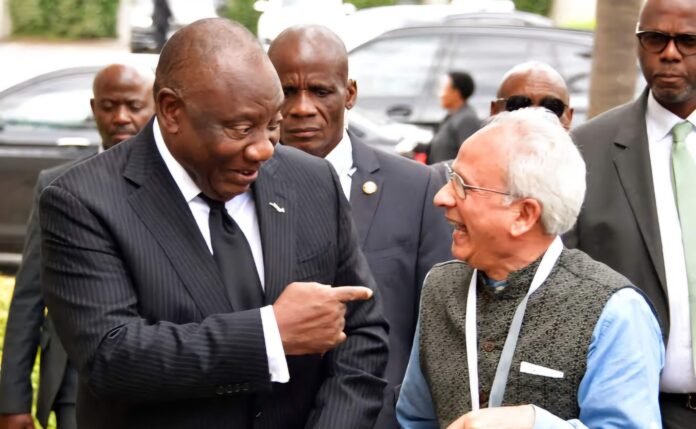In the wake of a bombshell exposé alleging deep criminal infiltration of South Africa’s law enforcement and justice systems, President Cyril Ramaphosa has placed Minister Senzo Mchunu on special leave and named a surprising interim successor: law professor, former Gauteng MEC, and anti-corruption stalwart, Professor Firoz Cachalia.
Ramaphosa, during a televised address to the nation, said:
“I have appointed Professor Firoz Cachalia as the Acting Minister of Police. Prof. Cachalia is a Professor of Law at the University of the Witwatersrand and Chairperson of the National Anti-Corruption Advisory Council. He has previously served as MEC for Community Safety in Gauteng.”
Cachalia, who officially takes office on August 1, following his retirement from Wits University, brings an impeccable academic and governance résumé into what may be the most politically combustible Cabinet role in South Africa right now.
A lifetime of service and reform
Professor Firoz Cachalia, 66, was born in Benoni in 1958 and rose to prominence through his anti-apartheid activism, legal scholarship, and service in various public roles. His long-standing affiliation with the African National Congress and the United Democratic Front places him among the country’s most enduring figures of political transformation.
He’s served as:
- MEC for Community Safety (2004–2009)
- MEC for Economic Development (2009–2010)
- Speaker of the Gauteng Legislature (1999–2004)
- Member of the ANC NEC (until 2022)
- Chair of the National Anti-Corruption Advisory Council since 2022
Holding degrees from Wits University and an LLM from the University of Michigan, Cachalia has combined scholarship and statecraft in a career rooted in accountability.
Why now? And why Cachalia?
The decision to appoint Cachalia follows explosive allegations made by KZN police commissioner Lt-Gen Nhlanhla Mkhwanazi. The top cop accused Mchunu of colluding with criminal networks, interfering in investigations, and disbanding an elite task team probing political assassinations.
“This Commission is being established against the backdrop of significant progress in rebuilding and strengthening our country’s law enforcement agencies,” Ramaphosa stated.
He also confirmed the formation of a Judicial Commission of Inquiry, led by Acting Deputy Chief Justice Mbuyiseli Madlanga, to probe state capture within SAPS, the prosecutorial authority, and the judiciary.
Constitutional tensions and political blowback
While Ramaphosa relied on Section 91(3)(c) of the Constitution to justify appointing a minister from outside Parliament, critics—chief among them the EFF—say this move is unlawful.
The EFF’s statement declares:
“This is a direct violation of Section 98 of the Constitution… The President’s decision is therefore not just unlawful, but a deliberate abuse of the supreme law of the land.”
Cachalia’s prior role in the ANC’s NEC has also sparked debate over his impartiality. Some argue that appointing a politically-connected reformer to oversee an inquiry implicating ANC members could muddy public confidence in the outcome.
Others, like Tshwane’s EFF MMC for Health, Tshegofatso Mashababela, commented:
“The appointment of a retired politician over figures like Cassel Mathale in important government roles reveals certain dynamics at play. The decision to overlook individuals with active political involvement in favor of retired counterparts raises questions about the criteria and considerations employed in such selections.”
Corruption watchdog or symbolic gesture?
Since 2022, Cachalia has chaired the National Anti-Corruption Advisory Council, but critics say the council has underperformed.
A post on X lambasted the NACAC:
“South Africa’s National Anti-Corruption Advisory Council… has burned through taxpayer money with little to show for it. Corruption still festers in our police and courts.”
Yet, in public addresses, Cachalia has pushed back against simplistic views of reform:
“Much public discussion is focused on only one aspect of an effective response—i.e., criminal law enforcement after the fact,” he said at #IACD2024, stressing the need for deeper structural reforms.
The stakes have never been higher
Cachalia’s appointment represents a bold pivot—one that could either rehabilitate public trust or entrench scepticism.
His biggest challenge? Overseeing the SAPS during a period when the institution faces its worst legitimacy crisis since the dawn of democracy.
With the murder of rapper AKA still unresolved and whistleblowers like Mkhwanazi claiming interference in that and similar cases, the public will be watching every move Cachalia makes.
Can he clean house?
Professor Firoz Cachalia has been called many things: academic, activist, public servant, political veteran. Now he carries a new title—Acting Minister of Police.
The question is not just whether he’s up to the task—but whether the system around him is ready for the kind of accountability he represents.
Because in a nation gripped by scandal, even a man of integrity can get lost in the smoke.

